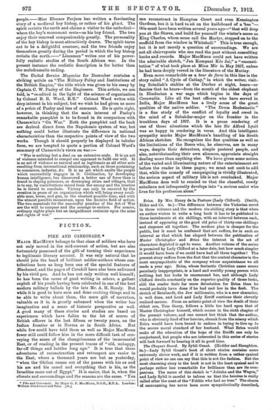FICTION.
PIKE AND CABKONADE, *
Melon MACMUNN belongs to that class of soldiers who have not only moved in the mid-current of action, but are also fortunately possessed of the gift of turning their experience to legitimate literary account. It was only natural that he should join the band of brilliant soldier-authors whose con- tributions have so long been one of the special features of Blackwood, and the pages of Cornhill have also been enlivened by his vivid pen. And he has not only written well himself; he has been the cause of good writing in others, a gallant exploit of his youth having been celebrated in one of the best modern military ballads by the late Mr. A. H. Beesly. But while it is good to have seen and done exciting things and to be able to write about them, the mere gift of narration, valuable as it is, is greatly enhanced when the writer has imagination and a sense of historic perspective as well. A good many of these stories and studies are based on experiences which have fallen to the lot of scores of British officers in the last fifteen or twenty years, on the Indian frontier or in Burma or in South Africa. But while few could have told them as well as Major MacMunn fewer still could follow him in the more difficult task of con- veying the sense of the changelessness of the immemorial East, or of reading in the present traces of "old, unhappy, far-off things and battles long ago." It is true that these adventures of reconstruction and retrospect are easier in the East, where a thousand years are but as yesterday, "when the Ghilzai comes out of the passes with his ox and his ass and his camel and everything that is his, as the Israelites came out of Egypt." It is easier, that is, when the climate and surroundings and the seasons are the same. "You • Pike and Carronade. By Major G. P. liacMann, D.S.O., S.P.A. London: William Blackwood and Sons. Dis.i can reconstruct in Hampton Court and even Kensington Gardens, but it is bard to sit on the knifeboard of a 'bus "— this must have been written several years ago—" that will drop you at the Stores, and build for yourself the winter's scene as King Charles, whom some call the Martyr, stepped on to the scaffold from the window in Whitehall." This is true enough, but it is not merely a question of surroundings. We are not all clairvoyants who can read the past without consulting books and records. Major MacMunn could not have written the admirable sketch, "Jan Kompani Kee Jai," a, "reconsti- tution" of what took place at Mia.n Mir in May 1857, unless he had been deeply versed in the literature of the Mutiny.
Even more remarkable as a tour de force in this line is the story called "A Cycle of Cathay," in which the writer, visit- ing Scindiah's stables at the Durbar at night, hears—or fancies that he bears—from the mouth of the oldest elephant in Hindustan a war saga which begins in the days of Cornwallis. Like all the best officers who have served in India, Major MacMunn has a lively sense of the great qualities of the native soldier. "The Drum Ecclesiastic" is a fine study of the conflict of loyalty and creed in the mind of a Subahdar-major on the frontier in the troublous days of 1897. It is a prose rendering of one of those situations which the late Sir Alfred Lyall was so happy in rendering in verse. And this intelligent sympathy marks Major MacMunn's handling of his South African sketches. He recognizes the fine qualities as well as the limitations of the Boers who, he observes, are in many ways, despite their detractors, simple pastoral people, and also, notwithstanding their own slimness, appreciate straight dealing more than anything else. We have given some notion of the varied and illuminating nature of the entertainment set before the reader in these pages; we must not omit to add that, while the comedy of campaigning is vividly illustrated, the serious aspect of military life is not overlooked. Major MacMunn does well to remind us that the cheerful, rowdy subaltern not infrequently develops into "a serious zealot who lives for his profession alone."






































































 Previous page
Previous page